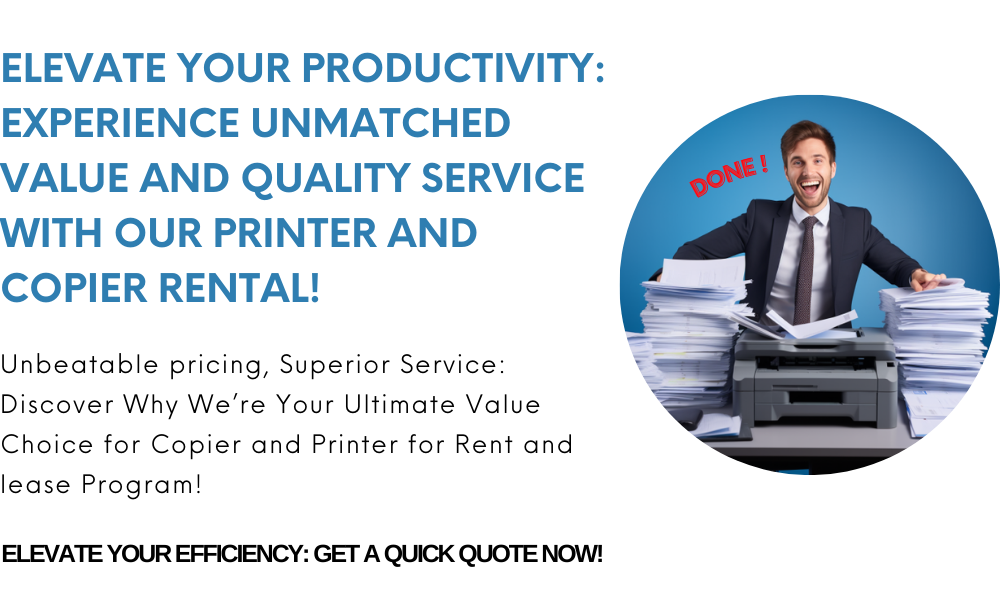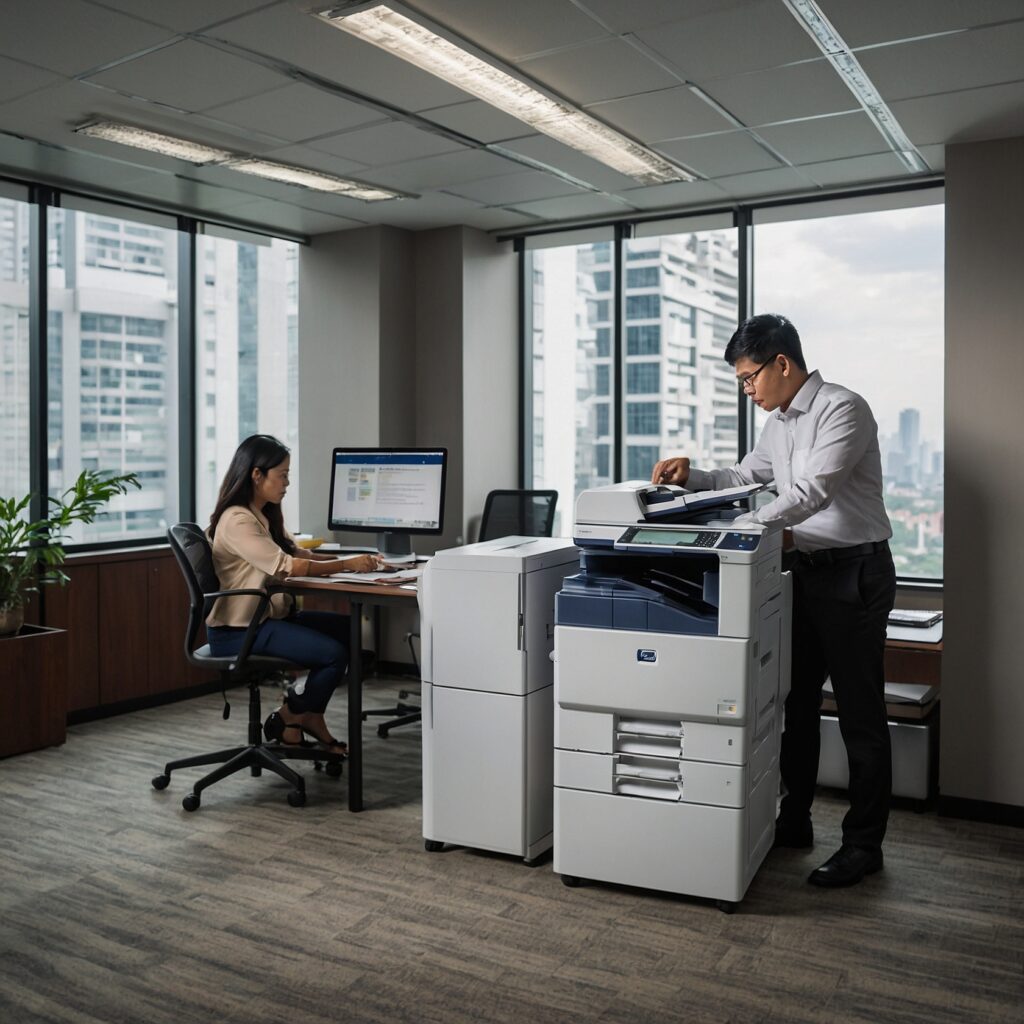
Enhancing Business Productivity through Copier Leasing

Enhancing Business Productivity through Copier Leasing
Part 1: How Copier Leasing Drives Efficiency and Growth
Introduction
In today’s competitive business environment, efficiency and productivity are key drivers of success. Companies are constantly seeking ways to streamline operations, reduce costs, and maximize resources. Copier leasing is an innovative solution that enables businesses to access high-quality office equipment without the burden of upfront investment.
This blog explores how copier leasing can enhance business productivity, the benefits it offers to entrepreneurs, and important policies tied to leasing agreements. From saving money to adopting the latest technology, copier leasing has become a strategic tool for businesses across industries.
Why Choose Copier Leasing Over Purchasing?
Leasing office equipment like copiers offers several advantages over outright ownership. While buying a copier might seem like a one-time expense, it often incurs hidden costs that can disrupt budgets and productivity.
1. Reduced Initial Investment
Purchasing a copier can cost thousands of pesos upfront, especially for advanced models with multifunction capabilities. Leasing eliminates this large expense, allowing businesses to conserve capital for other priorities like marketing, hiring, or expansion.
Example: A startup in Makati used its budget to hire additional staff instead of purchasing a copier. By leasing, they maintained operational efficiency while expanding their team.
2. Access to Advanced Technology
Copier technology evolves rapidly, and owning a machine often means dealing with obsolescence. Leasing ensures businesses always have access to the latest models, complete with features like cloud printing, energy efficiency, and enhanced security.
3. Predictable Monthly Costs
Leasing agreements typically involve fixed monthly payments, making it easier for businesses to manage budgets. This predictability eliminates unexpected costs associated with repairs or consumables.
4. Maintenance and Support Included
Most leasing contracts include maintenance and technical support. Businesses benefit from professional servicing without additional charges, minimizing downtime and improving productivity.
The Role of Copier Leasing in Enhancing Productivity
Copier leasing isn’t just about cost savings; it’s a powerful tool for improving business operations. Here’s how:
1. Streamlined Document Management
Modern copiers available through leasing agreements often include multifunction capabilities. These devices handle printing, scanning, copying, and faxing, reducing the need for multiple pieces of equipment and simplifying workflows.
Pro Tip: Look for copiers with cloud integration to enhance collaboration and document accessibility, especially for remote or hybrid work environments.
2. Minimized Downtime
Equipment failures can disrupt operations and delay projects. Leased copiers come with maintenance agreements that ensure timely repairs and regular servicing, keeping operations running smoothly.
3. Scalable Solutions
Leasing allows businesses to scale their copier usage according to growth. Whether you need more devices or advanced features, leasing offers flexibility without the commitment of ownership.
Example: A growing retail chain in Cebu expanded its copier fleet through a leasing provider, meeting increased demand without a significant financial outlay.
4. Improved Cost Efficiency
Leasing eliminates hidden costs associated with owning a copier, such as depreciation, repair expenses, and consumable shortages. By consolidating these costs into a single payment, businesses can allocate resources more effectively.
Key Policies and Terms in Copier Leasing
Understanding the policies tied to copier leasing agreements is crucial for maximizing their benefits. Here’s a breakdown of common terms and conditions:
1. Lease Duration
Leasing contracts typically range from 12 months to 5 years. Short-term leases offer flexibility, while long-term agreements often come with discounts. Entrepreneurs should choose terms that align with their business goals.
2. Maintenance Coverage
Maintenance is usually included in leasing agreements, covering routine servicing, repairs, and even replacement parts. Confirm response times for service requests to avoid prolonged downtime.
3. Consumables and Usage Limits
Some leases include consumables like toner and paper, while others charge separately. Additionally, many agreements have fair usage policies to prevent excessive wear on the equipment.
4. Upgrade Options
Leasing providers often allow businesses to upgrade to newer models during the contract period. This ensures continuous access to cutting-edge technology without additional investment.
5. End-of-Lease Terms
At the end of the lease, businesses can choose to renew the agreement, return the equipment, or purchase it at a reduced price. Clarify these options to plan for future needs.
Practical Advice for Entrepreneurs Planning to Lease Copiers
Leasing a copier is a significant decision that can impact productivity and finances. Here are actionable tips for entrepreneurs:
1. Assess Your Needs
Determine your document handling requirements before leasing. Consider factors like monthly print volumes, color versus black-and-white needs, and desired features such as wireless printing or scanning.
2. Compare Providers
Research leasing providers with strong reputations for reliability and customer service. Read reviews and request quotes from multiple companies to find the best value.
3. Negotiate Terms
Don’t settle for standard agreements. Negotiate for favorable terms like lower monthly payments, flexible upgrades, or inclusive consumables.
4. Train Your Team
Ensure employees know how to use the leased copier effectively. Proper training reduces errors, enhances productivity, and prolongs the equipment’s lifespan.
5. Monitor Usage
Track copier usage to identify inefficiencies, such as excessive printing or poor resource allocation. Use this data to implement cost-saving policies and renegotiate terms if necessary.
Real-Life Impact: A Case Study
The Challenge:
A mid-sized BPO company in Davao faced frequent disruptions due to outdated copiers. Repairs were costly, and the machines couldn’t handle the high volume of printing required.
The Solution:
The company switched to a leasing agreement, acquiring modern multifunction copiers with maintenance included. The provider offered a customized plan that matched the company’s usage patterns.
The Results:
- Reduced Downtime: Maintenance support minimized disruptions.
- Cost Savings: Monthly expenses decreased by 15%, as repair costs were eliminated.
- Enhanced Efficiency: Faster copiers improved document processing times, enabling employees to focus on core tasks.
This case illustrates how copier leasing can address operational challenges and drive measurable improvements in productivity.
FAQs
Q1: How does leasing compare to renting a copier?
Leasing involves long-term agreements with fixed monthly payments, while renting is typically short-term and more flexible. Leasing is ideal for businesses with ongoing document handling needs.
Q2: Are consumables included in leasing agreements?
Some providers include consumables like toner, while others charge separately. Clarify this detail to avoid unexpected costs.
Q3: Can I terminate a lease early?
Early termination policies vary by provider. Some agreements include penalties for early exit, so review the terms carefully before signing.
Q4: How do upgrades work in copier leasing?
Many providers allow mid-contract upgrades to newer models. Negotiate this option at the start of the agreement to ensure flexibility.
Q5: What happens if the copier breaks down?
Maintenance and repairs are typically covered by the leasing provider, ensuring minimal downtime. Confirm response times and procedures in the contract.

Enhancing Business Productivity through Copier Leasing
Part 2: Advanced Strategies and Future Trends in Copier Leasing for Business Success
Introduction
In Part 1, we explored the foundational benefits of copier leasing and its impact on business productivity. Now, let’s delve deeper into advanced strategies businesses can adopt to optimize their leasing agreements and examine future trends shaping the copier leasing industry. By understanding these aspects, businesses can make informed decisions that drive efficiency, reduce costs, and stay competitive in an evolving market
Advanced Strategies for Maximizing Copier Leasing Benefits
To fully leverage copier leasing, businesses should move beyond basic usage and adopt strategic practices tailored to their unique needs.
1. Leverage Multifunction Capabilities
Many leased copiers offer multifunction capabilities, combining printing, scanning, copying, and faxing into a single device. By consolidating these tasks, businesses can:
- Eliminate the need for multiple machines.
- Save space and energy.
- Simplify employee workflows.
Example: A law firm in Quezon City integrated a leased multifunction copier with its document management system, allowing staff to scan legal documents directly into client folders, streamlining case preparation.
2. Optimize Print Policies
Implementing clear printing policies can maximize resource efficiency and reduce costs. For instance:
- Default all printing to black-and-white unless color is necessary.
- Enable duplex (double-sided) printing to save paper.
- Restrict high-quality printing to specific projects or teams.
Pro Tip: Use the copier’s built-in analytics to monitor usage patterns and identify areas for improvement.
3. Customize Leasing Agreements
Leasing providers often offer customizable plans. Businesses should negotiate terms that align with their operational goals, such as:
- Mid-contract upgrades to newer models.
- Scalable options for adding more devices as the business grows.
- Inclusive consumable packages to simplify budgeting.
4. Train Employees to Use Advanced Features
Most modern copiers include features like cloud integration, mobile printing, and security settings. Proper employee training ensures these tools are fully utilized, boosting productivity and reducing errors.
5. Regularly Review and Adjust Agreements
Business needs can change over time. Schedule regular reviews of your leasing agreement to ensure it still meets your requirements. Renegotiate terms or explore new options if your current setup becomes insufficient.
How Copier Leasing Supports Business Growth
Leasing copiers isn’t just about cost savings; it’s a catalyst for growth. Here’s how:
1. Enables Capital Reallocation
Leasing frees up capital that would otherwise be spent on equipment purchases. Businesses can redirect these funds toward expansion efforts, marketing campaigns, or staff development.
2. Keeps Businesses Competitive
By providing access to the latest technology, leasing ensures businesses stay competitive in their industries. Advanced copiers improve document quality, streamline operations, and enhance customer satisfaction.
3. Reduces Risk
Ownership comes with risks like depreciation, obsolescence, and repair costs. Leasing shifts these risks to the provider, giving businesses peace of mind and operational flexibility.
4. Supports Scaling Efforts
Growing businesses often face increasing document handling needs. Leasing agreements can be scaled to include additional machines or advanced features, ensuring smooth scaling without financial strain.
Case Study: A logistics company in Cebu added three high-capacity copiers to its fleet under an existing leasing agreement to handle increased demand during peak seasons, maintaining efficiency without overextending its budget.
The Future of Copier Leasing: Trends to Watch
The copier leasing industry is evolving rapidly, influenced by technological advancements and shifting business priorities. Here are key trends shaping its future:
1. Subscription-Based Models
The leasing industry is adopting subscription-based pricing, offering businesses the flexibility to pay based on usage or access specific features on demand.
Impact: Businesses can adapt their agreements to match seasonal demands or changing operational needs, optimizing costs.
2. AI and Predictive Maintenance
Artificial intelligence is enhancing copier leasing by enabling predictive maintenance. AI-powered machines can:
- Detect potential issues before they escalate.
- Automatically order consumables when supplies are low.
- Optimize device settings for energy efficiency and resource conservation.
Result: Businesses experience minimal downtime and reduced maintenance costs.
3. Cloud Integration and Remote Access
As remote and hybrid work models become the norm, copiers with cloud integration and mobile printing capabilities are in high demand. These features allow employees to:
- Print from any location.
- Access and share documents in real time.
4. Enhanced Security Features
With increasing concerns about data security, copiers now include features like:
- Encrypted printing to protect sensitive documents.
- Secure user authentication to prevent unauthorized access.
- Audit trails for tracking document handling.
Relevance: Businesses in industries like healthcare, finance, and legal services benefit from these security measures, ensuring compliance with data protection regulations.
5. Eco-Friendly Leasing Options
Sustainability is a growing priority for businesses and leasing providers. Future-focused leasing agreements include:
- Energy-efficient copiers that reduce electricity consumption.
- Consumable recycling programs to minimize waste.
- Digital-first solutions that promote paperless workflows.
Example: An eco-conscious advertising agency in Manila switched to a leasing provider offering certified green copiers, aligning with its sustainability goals and reducing costs by 15%.
Policies to Consider for Future Leasing Agreements
As the copier leasing industry evolves, policies and regulations are likely to adapt. Businesses should stay informed about changes, such as:
1. Flexible Lease Terms
Providers are offering more flexible lease terms to accommodate short-term projects or fluctuating demands. Businesses should prioritize agreements that allow for adjustments without penalties.
2. Data Privacy Compliance
With stricter data privacy laws, businesses must ensure their leased copiers comply with regulations. Policies should include encrypted storage, secure data deletion, and compliance certifications.
3. Sustainability Incentives
Future leasing agreements may include incentives for adopting eco-friendly practices, such as discounts for using energy-efficient devices or participating in recycling programs.
4. Fair Usage Revisions
As devices become more advanced, fair usage policies may evolve to reflect new capabilities. Businesses should review these policies regularly to avoid unexpected charges.
FAQs
Q6: How can I ensure my leasing agreement meets future business needs?
Choose providers that offer scalable plans, mid-contract upgrades, and flexible terms. Regularly review your agreement to ensure it aligns with your evolving requirements.
Q7: Are short-term leasing options available for specific projects?
Yes, many providers offer short-term leases for events, seasonal operations, or temporary business needs. These agreements provide flexibility without long-term commitment.
Q8: What are the environmental benefits of copier leasing?
Leasing reduces e-waste by allowing providers to refurbish and recycle equipment. Many agreements also include energy-efficient devices and consumable recycling programs, promoting sustainability.
Q9: Can I customize my copier leasing plan based on my business needs?
Yes, many leasing providers offer customizable plans. You can negotiate features like consumables inclusion, upgrade options, and lease durations to align with your specific requirements.
Q10: What is the difference between leasing and renting a copier?
Leasing typically involves long-term agreements with predictable monthly payments, while renting is often short-term and more flexible. Leasing is ideal for ongoing needs, whereas renting suits temporary projects.
Q11: How do I calculate the ROI of a copier lease?
Consider factors like cost savings from maintenance and upgrades, reduced downtime, and improved efficiency from advanced features. Compare these benefits to your leasing costs to assess the return on investment.
Q12: Are there penalties for exceeding usage limits in a lease agreement?
Some agreements include fair usage policies, and exceeding these limits may result in additional charges. Review your contract carefully and monitor usage to avoid penalties.
Conclusion
Copier leasing is more than a cost-saving strategy; it’s a pathway to enhanced productivity, technological advancement, and sustainable growth. By adopting advanced leasing strategies and staying informed about future trends, businesses can position themselves for success in a rapidly changing market.
Whether you’re a startup or an established enterprise, copier leasing provides the tools and flexibility needed to thrive. Start exploring your options today to unlock the full potential of this innovative solution.
Start Renting Today
Printer rentals provide a practical, flexible, and budget-friendly solution for businesses of all sizes. Whether you’re comparing printer rentals vs. purchasing, searching for eco-friendly options, or exploring solutions for high-performance printers, we have the right plan for you.
For more answers to common questions, visit our printer rental FAQs. Explore our customizable printer rental contracts and find the perfect fit for your business needs today. Let us help you enhance efficiency and flexibility with a rental plan designed for success.
To learn more about printer rentals and how Marga Enterprises can support your green initiatives, contact us today at 09171642540 or 09614481276. You can also reach us via email at marga.enterprises2013@gmail.com. Let’s work together to build a greener, more sustainable future for generations to come. Visit Marga Enterprises and find out why we are the No. 1 Copier & Printer Rental Provider in the Philippines.
Join our growing community on Facebook and Youtube for exclusive content and discussions designed to propel your business forward. Stay updated on our posts and be part of the conversation!